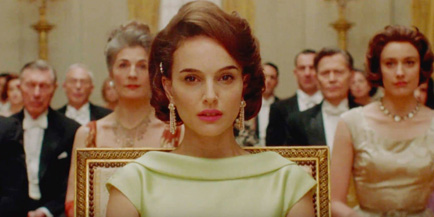Movie Review: Jackie
By Matthew Huntley
December 19, 2016
BoxOfficeProphets.com

The film takes place just weeks after President John F. Kennedy's assassination and intertwines the events of that unforgettable day in November 1963 with Jackie's LIFE magazine interview with journalist Theodore H. White (Billy Crudup), during which she recounts her version of the day's events and its immediate aftermath. Although the finished article only ended up as two pages, White's words poignantly captured Jackie's grief and, as he described it, “frail hope.” Jackie likely had a lot to do with this, as she only agreed to give the interview if she was able to edit the finished piece. This version of Jackie, as played by Natalie Portman, is commanding, abrasive, bitter, misanthropic and stubborn, but given what she's recently endured, and continues to endure, who could blame her?
Despite its title, Jackie is not a full-fledged biopic, and it's all the better for it. Noah Oppenheim's screenplay is lean and focused; it hones in on a very specific time and event that allows director Pablo Larraín to create a snapshot of history that tells us only what we need to know. This is a story about a grieving woman who's angry, resentful and unsure of what's going to happen next, a woman who went from filling one of the most prominent female roles in the world and always being in the spotlight to only being in the spotlight.
Of course, after JFK's death, Jackie remained as popular as ever, if not more so. The quarter of a million people who watched JFK's funeral procession on the streets of Washington, D.C., and the many more millions who watched it on TV, probably got a sense of what she was feeling, but Jackie sets out to confirm it. What I admire most about it is the way it seems to actively go against painting her as a cheerful, positive woman of faith who believed everything that happened was part of some divine plan and that she necessarily wanted to be what White says was “a mother to all of us.” On the contrary, Jackie admits, “I never wanted fame; I just became a Kennedy.”
The film makes it a point to show that Jackie's sophisticated and affable image is something she had to work hard at upholding and that it was partly a front. During her filmed tours of the White House, when Jackie describes her restorations of certain rooms as a means to bring “life to a cold house,” she comes across as robotic, submissive and one-dimensional. But this is sharply different from the frank and brazen way she speaks to White during their interview and, later on, a priest (John Hurt), whom she seeks out for spiritual answers and guidance following her husband's death. The scenes with the priest are some of the film's best because the priest himself is so candid and doesn't merely placate Jackie or give her false comfort. Instead, he reminds her that God doesn't always do things that make sense and, no matter how much we don't want to hear it, to accept the things we cannot change. It's Jackie and the priest's shared moments that feel the rawest and true.
Overall, the film's themes may seem a bit on the obvious side, but that doesn't make them any less relevant. It does, however, make the film feel dry at times, with some of the reaction shots and dialogue seeming redundant, as when Jackie looks upon the newly appointed President Johnson (John Carroll Lynch) and First Lady (Beth Grant) with resentment, or the conversations she has with Bobby Kennedy (Peter Sarsgaard) and Jack Valenti (Max Casella) about JFK's funeral or her having to move out of the White House. The story harps on the same conflicts one too many times.
Nevertheless, the film is a showcase for the cast. Natalie Portman embodies the role of Jackie with utter conviction, which is not to say she simply does a good impression or looks the part (although she does), but that she makes this version of Jackie her own. She lends credence to the idea that biopics need not necessarily be about real historical figures so long as the actors playing the subjects invest enough weight and complexity into them. She's equally matched by John Hurt, who's so humble and genuine as the priest. He just might give the film its second Oscar nomination for acting, with Portman likely being the first.
One other notable performance comes from Caspar Phillipson as JFK. He looks most like his real-life counterpart, which helps for sure, but it's his restraint to overact or merely accent JFK's most memorable features that make him stand out. He's completely natural and there were times when I felt I watching the real JFK onscreen.
I'd be curious to know whether the real Jackie Kennedy would find Jackie to be a faithful representation or grossly inaccurate? If she saw herself the way Portman plays her, would she admit it? I believe Jackie is accurate to a degree, but when it comes to narratives about real people, accuracy isn't as important as drama, and this is effective drama. Oddly enough, it stems from what Jackie called “the great divide between what people believe and what I know to be real.”